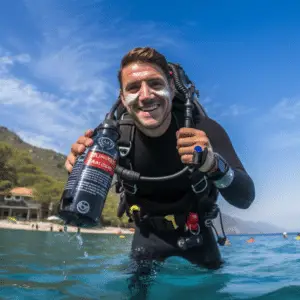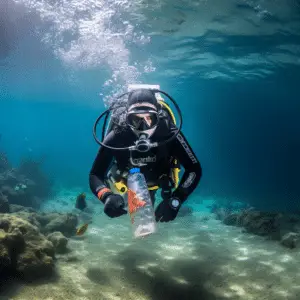What to drink before a dive, The significance of maintaining a healthy fluid balance is a theme that runs across every aspect of our life.
Doctors recommend that we have at least 8 glasses of water a day, and there is no wonder why. Water is an essential part of our diet, and it ensures that all of our organs are functioning correctly. This includes the most important organ- the brain.
Hydration is essential for maintaining the body and making sure that we are capable of completing general tasks, for example, water helps with lubrication of joints, disposal of bodily waste, and regulating temperature.
Water is especially important for someone who does regular activity, as when you do activities, you burn through calories and water resources you have. Because you are supported by water, it is a common misconception that scuba diving isn’t an extremely demanding sport. Because of this and because of the environment that scuba diving occurs, people tend to forget just how important hydration is as a part of the sport. A lot of people focus on the calories burned while scuba diving as opposed to the other resources that the body uses.
In fact, the water content that we have in our bodies can be lost in a vast number of ways when we are scuba diving.
Ways in which we lose water when diving

Salt
When you scuba diving hydration , it is likely that you will be diving in saltwater. This means that your skin will have direct contact with salt when you are completing the sport. Unless you rinse your body thoroughly in fresh water, then that salt will stay on the surface of your skin. Salt is hygroscopic, which means that it will retract water from skin tissue and allow it to evaporate if it can.
Sweat
With every sport that you do, if you are fully immersing yourself, you can experience sweating. This is especially the case for scuba diving, after all, you are covered up by a wetsuit which allows very little room for your skin to breathe- it would be comparable to running on a treadmill covered in plastic wrap. As you sweat, you use valuable water resources in your body.
Breathing/Respiration
You may not know this, but you actually lose a small percentage of water vapor when you breathe. When you scuba dive, the amount that you respire increases drastically due to the way in which you are taking in oxygen, which means you will lose substantially more of your body’s water content.
Sun exposure
Scuba diving isn’t exactly an activity that you choose to do in the middle of winter. You are much more likely to take part in the sport during the hotter months, which means much more exposure to the sun. As we are exposed to the sun, we naturally sweat much more, and as a result of this, we lose a vast amount of stored water. Not only this, but scuba divers that spend a lot of time in the water during the more sunny months are also much more likely to get a sunburn. When we get a sunburn, the fluids in our body naturally rushes to the damaged bit of skin.
Why is dehydration so bad for divers?
Weakness and exhaustion
No matter what fun advertisements of scuba diving may lead you to believe, scuba diving is actually an extremely exhausting sport. You will learn this in the length of time it requires to learn scuba. It can be really demanding and tiring for the body. A symptom of dehydration is also weakness and exhaustion, mixed with the common exhaustion that you will find yourself feeling when scuba diving can be a recipe for disaster. Dehydration can pop up almost out of nowhere, which is not what you want when you are several meters underwater.
Compromised motor abilities
As previously discussed, hydration is essential to making sure that your joints are all in working order. If you’re really dehydrated, swimming could be a real challenge. When you are diving, you only have a finite amount of oxygen, and so you don’t exactly have the time to float around waiting for your body to get moving again. Even if you did have the time, your motor skills wouldn’t improve without access to water, which you won’t get if you are in the sea.
Reduction to awareness
At some point or another, I’m sure that you have had an experience where you have been dehydrated and felt delirious and confused. This is easily fixable if you are above the surface and can quickly locate water. However, when you are scuba diving, this can become a big issue. When you are scuba diving, you need to be aware of your surroundings. This is because there are a number of issues that can easily occur when you aren’t aware of your surroundings. You could easily damage your equipment or even hurt yourself. Though it is not likely, you can potentially even open yourself up to attacks from predators such as sharks.
A guide to staying hydrated appropriately

Knowing how crucial it is to maintain enough fluid levels while submerged, you may be wondering what measures you may take.
Truthfully, you are going to have to achieve the majority of your hydration when you are above the water’s surface. If you know that you have scuba diving planned for the day, you should wake up and make hydration your first priority. Make sure that you are drinking plenty of water before you even enter the water, this means you won’t have to resurface to hydrate constantly.

